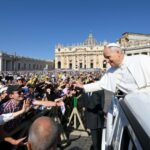Gospel: Luke 1:1-4; 4:14-21
Illustrious Theophilus: Since many have undertaken to compile a narrative of the things that have been fulfilled among us, just as those who from the beginning were eyewitnesses and ministers of the word have delivered them to us, it seemed good to me also, having carefully investigated everything from the beginning, to write to you in order, so that you may know the certainty of the teachings you have received. Jesus, full of the power of the Spirit, returned to Galilee, and His fame spread throughout the region. He taught in the synagogues, and everyone spoke well of Him. He came to Nazareth, where He had been brought up. As was His custom, He entered the synagogue on a Sabbath and stood up to read. They handed Him the book of the prophet Isaiah, and when He opened the book, He found the place where it was written: “The Spirit of the Lord is upon me, because He has anointed me to proclaim good news to the poor; He has sent me to proclaim liberty to the captives, and recovery of sight to the blind, to set free those who are oppressed, and to proclaim the year of the Lord’s favor.” Then He rolled up the scroll, gave it back to the attendant, and sat down. The eyes of all in the synagogue were fixed on Him. And He began to say to them, “Today this Scripture has been fulfilled in your hearing.”
Fruit: To lift one’s gaze to Christ the Savior.
Guidelines for reflection:
Luke, probably the best-prepared evangelist, introduces his narration with a clear purpose: to recount the story of Jesus as he has received it. This task is so important that he has dedicated himself to investigating among witnesses who were closest to Him, including the Most Holy Virgin and Saint Peter. In this passage, he shows us the first public act of the Messiah, framing it within the Trinitarian revelation (moved by the Spirit…).
1. The Spirit of the Lord is upon me
In these few verses, the phrase “the power of the Spirit” appears twice. Jesus Christ did not come into this world alone; He is not a God who has nothing to do with Yahweh, the God of the Old Testament. On the contrary, there is only one God, the Father, mighty, terrible, of the Old Testament, and Christ Himself, who will reveal Himself to us. Where is the union between the two? Mainly in the Holy Spirit, the third person of the Trinity, and often the most forgotten. Christians worship one God, Creator, Redeemer, Sanctifier, in three persons. The prophets, like Isaiah, had prepared this Trinitarian revelation unknowingly. But a direct intervention of God was necessary, a “homily” of Christ in the synagogue, to perceive this sublime mystery.
2. A saving and redeeming spirit
Jesus, in His first public intervention, reveals the essence of His message: He, with the power of the Holy Spirit, comes to save mankind. Looking at history, we are frightened by the terrible evils that humans have committed: World Wars, with the destruction and death they brought, authoritarian regimes that ended the lives of millions. Evil seems like a shadow devouring us, with no possibility of change. In that darkness, the message of Jesus Christ resonates: I have come to bring salvation, good news, liberation.
3. Turn your eyes to the face of Christ
Turn your eyes to the face of Christ, the only Savior of the world, yesterday, today, and forever. We have begun a new year, and it’s good to pause and think: Do I realize that I need a Savior, who saves me from my sin? Do I feel saved by Christ? Do I see Him as my Savior? Or do I think I don’t need anyone’s help, that I can succeed on my own? Or have I chosen despair in the face of the world’s difficult situation? Duc in altum!, Rema mar adentro. A valid exhortation also for our days, and valid for the start of each year. We have a Savior, high in heaven, who intercedes for us, who loves us so much that He has come down to our littleness, became man, and died for us. With this confidence, let us row out to sea, trusting in the Lord amid the storms of our lives.
Purpose: I will instill optimism in my conversations with others.









